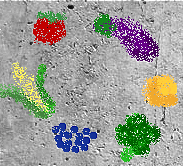About Us:
EGA is a New York City government initiative, detailed in POLICY / RESOLUTION X [tk], to facilitate and foster a shift to a more sustainable food system in New York, by reducing the production and consumption of animal-based foods including beef, pork, poultry, dairy, and eggs.
We seek to engage New York City residents of varying ages, ethnic backgrounds, and geographical locations in this initiative, through a city-wide campaign consisting of posters strategically placed in subways [TK other locations?] as well as billboards dispersed throughout the city [TK - more specific?]
We seek to engage New York City residents of varying ages, ethnic backgrounds, and geographical locations in this initiative, through a city-wide campaign consisting of posters strategically placed in subways [TK other locations?] as well as billboards dispersed throughout the city [TK - more specific?]
Why NYC?

In December 2006, the New York City municipal government released PlaNYC 2030, a comprehensive plan to strategically deal with the real challenges NYC will be facing over the course of the next 25 years. Of the three principal focus areas is the environment, and several initiatives have already been taken -- including a greenhouse gas inventory, the GreeNYC campaign, and an ongoing series of outreach events.
The efforts of Council member Christine Quinn -- Food Works -- as well as Manhattan Borough President Scott Stringer --Blueprint for a Sustainable Food System -- have helped bring light to a gap in PlaNYC: food as an integral component to environmental, economic, and social sustainability.
The Eating the Green Apple campaign takes one more leap and focuses specifically on how reducing consumption and production of animal-based products (meat, eggs, and dairy) is a crucial element to combating climate change.
New York City stands out in both its high population density -- being as it is the most populous city in the United States -- as well as its exceptional cultural diversity. More than one-third of the New York City population is foreign-born (NYC Dept of City Planning, 26)
Thus, NYC has an opportunity to be a leader in addressing the ever burgeoning issue of animal-based food consumption and climate change by not only developing strategic policy initiatives, but engaging the public to create long-term change.
The efforts of Council member Christine Quinn -- Food Works -- as well as Manhattan Borough President Scott Stringer --Blueprint for a Sustainable Food System -- have helped bring light to a gap in PlaNYC: food as an integral component to environmental, economic, and social sustainability.
The Eating the Green Apple campaign takes one more leap and focuses specifically on how reducing consumption and production of animal-based products (meat, eggs, and dairy) is a crucial element to combating climate change.
New York City stands out in both its high population density -- being as it is the most populous city in the United States -- as well as its exceptional cultural diversity. More than one-third of the New York City population is foreign-born (NYC Dept of City Planning, 26)
Thus, NYC has an opportunity to be a leader in addressing the ever burgeoning issue of animal-based food consumption and climate change by not only developing strategic policy initiatives, but engaging the public to create long-term change.
